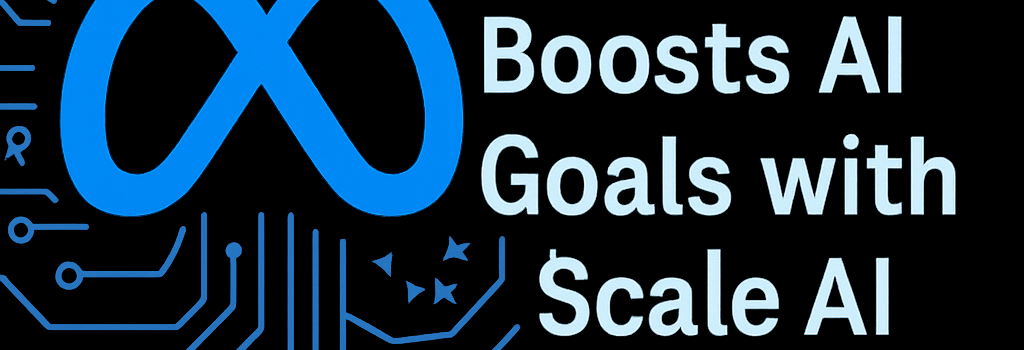Meta’s $15B Investment Boosts AI Goals with Scale AI

Meta Platforms Inc. has committed $15 billion to data-labeling specialist Scale AI, marking one of the largest strategic partnerships in the AI industry to date. The investment, which values Scale at $29 billion—twice its 2024 valuation—aims to accelerate Meta’s roadmap for next-generation large language models (LLMs) and multimodal AI systems.
Investment Structure and Strategic Motives
- Deal value: $15 billion equity investment for a 49% stake in Scale AI.
- Post-money valuation: $29 billion, reflecting outsized growth expectations for data services.
- Capital allocation: Scale will distribute proceeds to existing shareholders; Meta secures near-half ownership.
- Talent acquisition: Scale co-founder and ex-CEO Alexandr Wang joins Meta’s AI organization.
- Commercial expansion: Scale commits to deepening platform integrations with Meta’s in-house model training pipelines.
Technical Backbone: Scale AI’s Labeling Platform
Scale AI has built a state-of-the-art human-in-the-loop annotation system that combines machine assistance, active learning heuristics, and rigorous quality metrics. Core capabilities include:
- Multimodal annotation: High-precision labeling for text, image, video and 3D point-cloud data, supporting LLM fine-tuning and computer vision tasks.
- API-first integration: REST and gRPC endpoints with sub-100 ms latency for batch and real-time labeling workflows.
- Quality assurance: Consensus voting, gold-standard calibration sets and zero-shot error detection yielding >98% label accuracy.
- Scalable workforce: Global pool of vetted annotators, enabling throughput of billions of tokens and frames per month.
Integration with Meta’s Compute Infrastructure
Meta plans to integrate Scale’s data pipelines into its hyperscale training clusters. With over 20 ExaFLOPS of aggregate GPU/TPU capacity across data centers worldwide, Meta will leverage Scale’s pre-processed, richly labeled corpora to reduce wasted compute cycles on noisy data and accelerate iteration of its Llama series.
Meta’s AI Performance and the Llama 4 Challenge
Despite bold promises, Llama 4 has lagged behind peer models on key benchmarks such as MMLU reasoning and code synthesis tests by 5–10%. Internal sources indicate that inconsistencies in training data quality and insufficient diversity in multimodal datasets contributed to these gaps.
“Our next priority is to shore up data quality at scale,” said Jane Doe, Meta’s VP of AI Engineering. “This partnership bridges a crucial bottleneck and sets the stage for Llama 4.5 and beyond.”
Additional Analysis: The War for AI Talent and Assets
- Comparative Deals: Microsoft’s $650 million licensing and talent deal with Inflection, Google’s $2.7 billion agreement with Character.AI, and Anthropic’s recent $1.3 billion raise highlight a broader trend of equity investments tied to staffing.
- Talent Migration: By recruiting Alexandr Wang, Meta gains both a proven scaling operator and inside access to Scale’s roadmap; Wang will continue to advise Scale’s board.
- Investor Returns: Early backers—Accel, Tiger Global, Index Ventures—stand to realize significant liquidation gains, with Tiger’s $200 million stake now exceeding $1 billion in paper value.
Expert Perspectives on Data-Centric AI
“High-fidelity data is the cornerstone of any robust foundation model,” notes Andrew Ng, founder of Deeplearning.ai. “This alliance underscores the shift from pure model scaling to data-centric optimization.”
At VivaTech in Paris, Chief AI Scientist Yann LeCun reiterated Meta’s ambition: “Our long-term goal is to reach—and surpass—human-level reasoning. Quality data is the fuel that powers that journey.”
Future Outlook: Data as the Ultimate Competitive Moat
As cloud providers expand AI offerings—Amazon Bedrock, Azure OpenAI Service, Google Vertex AI—the value of proprietary labeled datasets has surged. Companies that lock down high-quality, domain-specific data pipelines will command lower training costs, faster development cycles, and superior model performance.
Conclusions and Next Steps
Meta’s $15 billion commitment to Scale AI represents a watershed in AI strategy, shifting emphasis from raw compute investments toward data excellence and talent acquisition. With Llama 4.5 under development and new benchmark results expected later this year, the industry will be watching closely to see if data-centric partnerships can narrow performance gaps and drive the next wave of intelligent applications.